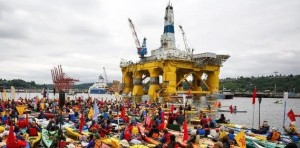 It is illegal to set fire to someone’s house; we believe it is also illegal for fossil fuel companies to knowingly burn our common home. Today, the global call for climate justice is growing louder, Sara Shaw and Freek Bersch write
It is illegal to set fire to someone’s house; we believe it is also illegal for fossil fuel companies to knowingly burn our common home. Today, the global call for climate justice is growing louder, Sara Shaw and Freek Bersch write
Twenty years ago, Shell made a prediction. In a scenario-planning exercise, the fossil fuel company prophesied a series of violent storms caused by catastrophic climate change would hit the east coast of the United States. Following the storms, the 1998 document unearthed by journalist Jelmer Mommers says, ‘a coalition of environmental NGOs brings a class-action suit against the US government and fossil-fuel companies on the grounds of neglecting what scientists (including their own) have been saying for years: that something must be done.’
Shell’s oracles could have not have been more accurate. The social reaction to the use of fossil fuels is growing, and people are fed up with corporate impunity and are fighting the British-Dutch oil giant in the world’s courts.
Shell knew that its operations would increase the likelihood of extreme weather events, such as last year’s hurricanes Irma, Jose, Maria and Harvey. Shell has known since the 1960s that CO2 contributes to global warm-ing and that fossil fuels are a primary source of CO2 emissions. And Shell knew that we, the inhab-itants and caretakers of this planet, would become fierce opponents of their company and demand action.
The People vs. Shell
Shell’s activities and business model constitute a profound risk for humankind. In April, Friends of the Earth Netherlands (Milieudefensie) wrote to Shell, arguing that the company is breaching its legal duty of care by undermining the Paris climate agreement. In that letter we demanded that the company align its business activities with that agreement, reduce oil and gas investments, and re-duce greenhouse gas emissions to zero by 2050. Shell rejected our demands in their response sent on Monday. Worse, the company callously urged shareholders to vote against a resolution asking the company to set emission reduction targets in line with the Paris agreement at its annual general meeting last week. Most investors followed Shell’s advice and the resolution was rejected.
Since Shell rejected our demands, we are taking the company to court in the Netherlands to force them to reduce their emissions to net-zero by 2050. Our case is unique because we are not seek-ing compensation for damages. Instead, we are demanding that Shell aligns its business model with climate targets and that fossil fuels be kept in the ground. More than 25,000 people from 80 countries have already supported our case against Shell, including almost 12,000 Dutch citizens as co-claimants. If successful, our ground-breaking case will significantly limit Shell’s global oil and gas investments.
We’re using the Dutch legal system to stop Shell because its Netherlands-registered parent company, Royal Dutch Shell, determines the group’s climate policy. Dutch law places Shell under a legal obligation to respect human rights and act responsibly, in accordance with the applicable duty of care standard. Duty of care is an open legal standard to be substantiated on the basis of the circumstances of the case at hand. The standard is determined on the basis of scientific findings and treaty provisions, among other things. By its own admission decades ago, Shell does not operate in a vacuum. Its actions affect all life on our planet, and Shell cannot be allowed to continue its willful and reckless destruction of the climate.
Gathering storm of climate ligation
The climate litigation movement is gaining momentum worldwide, as people increasingly see the courts as a way to hold to account polluting corporations and the governments that protect them. Last week, the People’s Climate Case began action against the European Union, demanding an urgent increase in its 2030 climate target. In 2015, the first climate case against a national government – the Urgenda Climate Case – was won in the Netherlands when a court ordered the Dutch state to increase its emissions reduction ambi-tions. This is currently under appeal and a final decision is expected in October.
In March, 21 young people who are suing the US Government for failing to address climate change won the right to proceed with their case. And in the UK, legal charity Plan B Earth and 11 co-claimants are suing the British Government to force a reduction in the carbon target. The New York City government announced in January that it would hold the five largest oil companies, including Shell, financially responsible for the infrastructure needed to protect the city from the consequences of climate change. By now, climate cases have been filed against Shell by 10 US cities and counties. Meanwhile, the Philippines human rights committee has started an investigation into human rights violations by Shell and 46 other fossil fuels companies for their role in causing catastrophic climate change.
Shell chair Charles O. Holliday asked investors at the annual general meeting to trust the company, but it is clear that Shell cannot be trusted, so we will have to force it to comply with the law. Shell claims it fully supports the Paris agreement targets, but it produces twice the total greenhouse gas emissions of the Netherlands, while planning to continue to drill for oil and gas for decades to come. The climate litigation movement is increasing pressure on all fossil fuel companies and showing that they cannot continue to damage the climate with impunity.
